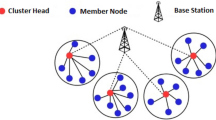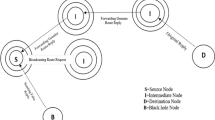Abstract
Effective management and control of large-scale networks can be challenging in the absence of appropriate resource allocation. This paper presents a framework for highlighting the significance of resource allocation in mobile, wireless, and ad hoc networks. The model has been designed to incorporate a clustering protocol and a schedule-based resource allocation algorithm, resulting in the establishment of a multi-objective framework. The proposed framework places a significant emphasis on the allocation of energy and distance, with a focus on minimizing these objectives. Each node is separated into several clusters where individual energy is allocated and the cluster head in each cluster allows the nodes to communication with shortest distance. For the transmitted information the speed of transmission is maximized thus more amount of time period is saved where stability factor is maximized. To test the allocated resources in the network the proposed method compares and evaluates the parametric outcomes with existing method based on five scenarios. In the comparative analysis it is observed that proposed method can able to maximize the life time and quality of service for all networks with optimized range of 84%.







Similar content being viewed by others
Data availability
The data that support the findings of this study are available from the corresponding author, upon reasonable request.
References
Salangai Nayagi, D., Sivasankari, G., Vinayakumar, R., Venugopal, K. R., & Sankar, S. (2022). Fault tolerance aware workload resource management technique for real-time workload in heterogeneous computing environment. Emerging Telecommunications Technologies. https://doi.org/10.1002/ett.4703
Sumesh, J. J. (2021). Energy conserving ring cluster-based routing protocol for wireless sensor network: A hybrid based model. International Journal of Numerical Modelling: Electronic Networks, Devices and Fields. https://doi.org/10.1002/jnm.2921
Zheng, Z., Jiang, S., Feng, R., Ge, L., & Gu, C. (2023). Survey of reinforcement-learning-based MAC protocols for wireless ad hoc networks with a MAC reference model. Entropy. https://doi.org/10.3390/e25010101
Tharuman, S., Sethuraman Sambath, K., Vinayakumar, R., Rajakumar, R., & Sonu, D. (2022). Neighborhood rough set-based route selection for mobile ad hoc networks. International Journal of Communication Systems. https://doi.org/10.1002/dac.5178
Rodr, A., & Del-valle-soto, C. (2020). Energy-effi cient clustering routing protocol for wireless sensor networks based on Yellow Saddle Goatfish algorithm. Mathematics. https://doi.org/10.3390/math8091515
Vasim Babu, M., Ramesh, S., Suthendran, K., & Vinayakumar, R. (2023). CE2RV: Commissioned energy-efficient virtualization for large-scale heterogeneous wireless sensor networks. International Journal of Communication Systems. https://doi.org/10.1002/dac.5480
Khan, M. F., Yau, K. A., Ling, M. H., & Imran, M. A. (2022). An intelligent cluster-based routing scheme in 5G flying ad hoc networks. Applied Sciences. https://doi.org/10.3390/app12073665
Jayaraman, R., Manickam, B., Annamalai, S., Kumar, M., Mishra, A., & Shrestha, R. (2023). Effective resource allocation technique to improve QoS in 5G wireless network. Electronics (Switzerland). https://doi.org/10.3390/electronics12020451
Pathak, S., & Jain, S. (2017). An optimized stable clustering algorithm for mobile ad hoc networks. Eurasip Journal on Wireless Communications and Networking. https://doi.org/10.1186/s13638-017-0832-4
Hemavathi, A. S. R., Alotaibi, Y., Khalaf, O. I., & Alghamdi, S. (2022). Authentication and resource allocation strategies during handoff for 5G IoVs using deep learning. Energies, 15(6), 1–27. https://doi.org/10.3390/en15062006
Khan, A., Khan, S., Fazal, A. S., Zhang, Z., & Abuassba, A. O. (2021). Intelligent cluster routing scheme for flying ad hoc networks. Science China Information Sciences, 64(8), 1–14. https://doi.org/10.1007/s11432-019-2984-7
Sondi, P., Abbassi, I., Ramat, E., Chebbi, E., & Graiet, M. (2021). Modeling and verifying clustering properties in a vehicular ad hoc network protocol with Event-B. Scientific Reports, 11(1), 1–15. https://doi.org/10.1038/s41598-021-97063-3
Sharma, A., & Kakkar, A. (2019). Machine learning based optimal renewable energy allocation in sustained wireless sensor networks. Wireless Networks, 25(7), 3953–3981. https://doi.org/10.1007/s11276-018-01929-w
Wang, X., Lyu, Z., Wei, Z., Wang, L., Lu, Y., & Shi, L. (2023). Multi-objective path planning algorithm for mobile charger in wireless rechargeable sensor networks. Wireless Networks, 29(1), 267–283. https://doi.org/10.1007/s11276-022-03126-2
Banerjee, I., & Madhumathy, P. (2023). QoS enhanced energy efficient cluster based routing protocol realized using stochastic modeling to increase lifetime of green wireless sensor network. Wireless Networks, 29(2), 489–507. https://doi.org/10.1007/s11276-022-03124-4
Tran, T. N., Van Nguyen, T., & An, B. (2019). An efficient connected dominating set clustering based routing protocol with dynamic channel selection in cognitive mobile ad hoc networks. Electronics (Switzerland). https://doi.org/10.3390/electronics8111332
Krishnamoorthy, V. K., Izonin, I., Subramanian, S., Shandilya, S. K., Velayutham, S., Munichamy, T. R., & Havryliuk, M. (2023). Energy saving optimization technique-based routing protocol in mobile ad-hoc network with IoT environment. Energies. https://doi.org/10.3390/en16031385
Al-Medhwahi, M., Hashim, F., Ali, B. M., Sali, A., & Alkholidi, A. (2019). Resource allocation in heterogeneous cognitive radio sensor networks. International Journal of Distributed Sensor Networks. https://doi.org/10.1177/1550147719851944
Haseeb, K., Abbas, N., Saleem, M. Q., Sheta, O. E., Awan, K., Islam, N., & Salam, T. (2019). RCER: Reliable cluster-based energy-aware routing protocol for heterogeneous wireless sensor networks. PLoS ONE, 14(9), 1–24. https://doi.org/10.1371/journal.pone.0222009
Zhang, S., Ni, Z., Kuang, L., Jiang, C., & Zhao, X. (2022). Load-aware distributed resource allocation for MF-TDMA ad hoc networks: A multi-agent DRL approach. IEEE Transactions on Network Science and Engineering, 9(6), 4426–4443. https://doi.org/10.1109/TNSE.2022.3201121
Hwang, H., & Ahn, J. M. (2022). Evolved wireless ad hoc network: Design and operating principle for wireless resource management of mobile terminals. IEEE Access, 10, 72155–72170. https://doi.org/10.1109/ACCESS.2022.3188801
Liu, J., Xu, Y., & Li, Z. (2019). Resource allocation for performance enhancement in mobile ad hoc networks. IEEE Access, 7, 73790–73803. https://doi.org/10.1109/ACCESS.2019.2921075
Khadidos, A. O., Alshareef, A. M., Manoharan, H., Khadidos, A. O., & Shitharth, S. (2023). Application of improved support vector machine for pulmonary syndrome exposure with computer vision measures. Current Bioinformatics, 18, 1–13. https://doi.org/10.2174/1574893618666230206121127
Hai, T., Zhou, J., Lu, Y., Jawawi, D. N. A., Wang, D., & Selvarajan, S. (2023). An archetypal determination of mobile cloud computing for emergency applications using decision tree algorithm. Journal of Cloud Computing. https://doi.org/10.1186/s13677-023-00449-z
Alqahtani, A. S., Kshirsagar, P. R., Manoharan, H., Balachandran, P. K., Yogesh, C. K., & Selvarajan, S. (2022). Prophetic energy assessment with smart implements in hydroelectricity entities using artificial intelligence algorithm. International Transactions on Electrical Energy Systems. https://doi.org/10.1155/2022/2376353
Kshirsagar, P. R., Manoharan, H., Selvarajan, S., Althubiti, S. A., Alenezi, F., Srivastava, G., & Lin, J. C. (2022). Changes using machine learning algorithms. Electronics. https://doi.org/10.3390/electronics11131950
Acknowledgements
The authors of this study extend their appreciation to the Researchers Supporting Project number (RSPD2023R544), King Saud University, Riyadh, Saudi Arabia.
Author information
Authors and Affiliations
Corresponding author
Ethics declarations
Conflict of interest
The authors declare no conflict of interest.
Additional information
Publisher's Note
Springer Nature remains neutral with regard to jurisdictional claims in published maps and institutional affiliations.
Rights and permissions
Springer Nature or its licensor (e.g. a society or other partner) holds exclusive rights to this article under a publishing agreement with the author(s) or other rightsholder(s); author self-archiving of the accepted manuscript version of this article is solely governed by the terms of such publishing agreement and applicable law.
About this article
Cite this article
Shitharth, S., Manoharan, H., Alsowail, R.A. et al. QoS enhancement in wireless ad hoc networks using resource commutable clustering and scheduling. Wireless Netw (2023). https://doi.org/10.1007/s11276-023-03499-y
Accepted:
Published:
DOI: https://doi.org/10.1007/s11276-023-03499-y




